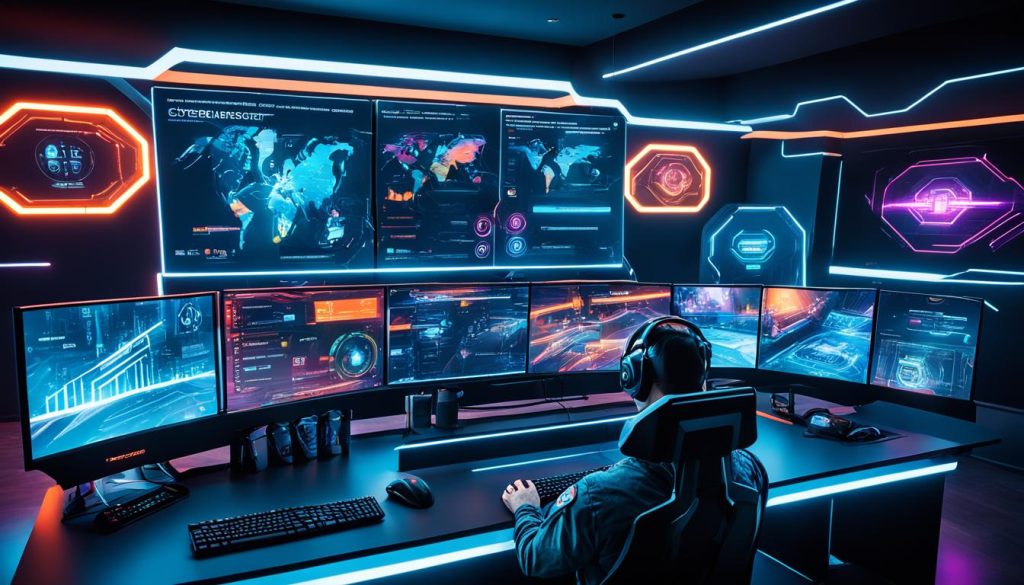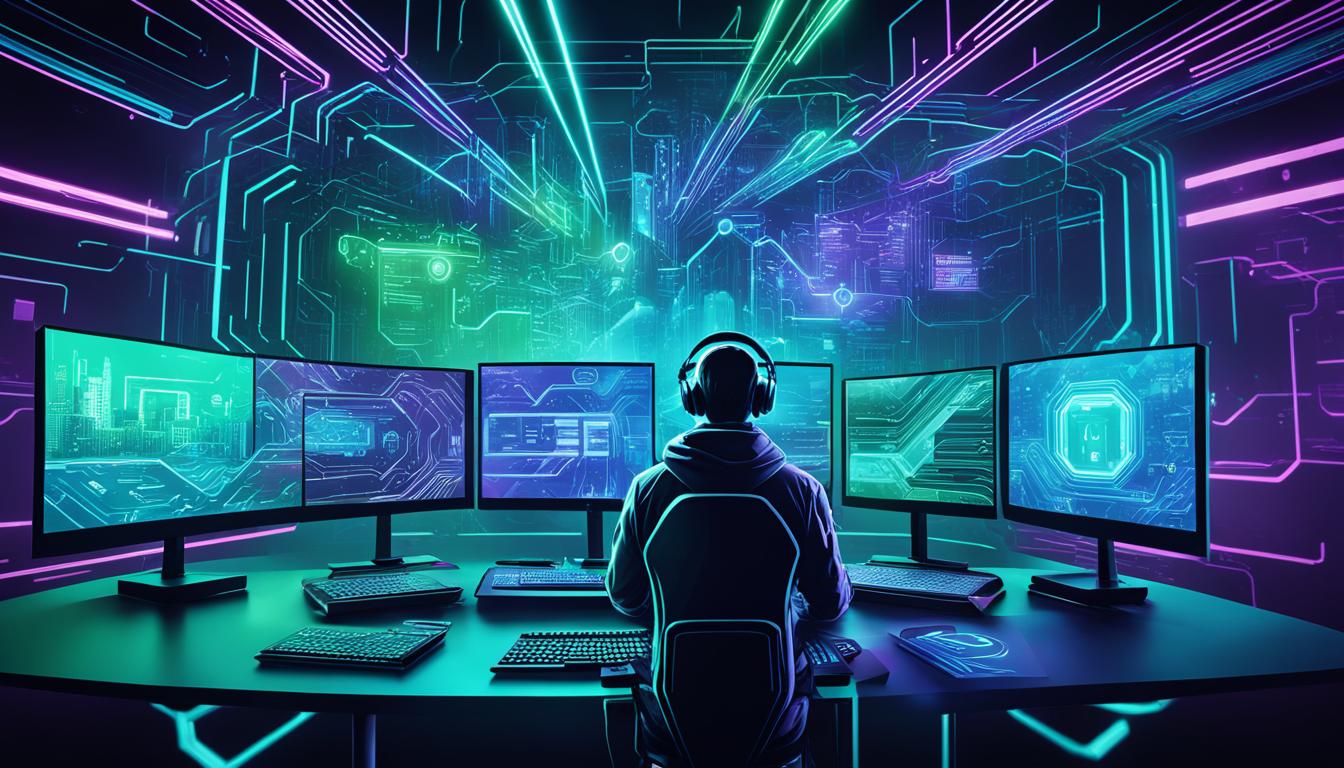The gaming industry has come a long way, evolving from classic arcade games to immersive experiences like Fortnite, FIFA 17, Call of Duty, GT Sport, Metal Gear Solid, and PUBG. With the industry’s rapid growth, projected to reach a staggering $180.1 billion in revenues by 2021, it has also become a lucrative target for cybercriminals. According to an Akamai report, hackers carried out a staggering 12 billion attacks on the gaming industry in just 17 months.
The gaming industry is a prime target for cyber attacks due to the vast amounts of personally identifiable information (PII) and credit card information it holds. The consequences of a breach can be severe, including financial and reputational damage, as well as the loss of customer trust. It is crucial for the gaming industry to prioritize cybersecurity to protect players, maintain the integrity of esports events, and safeguard the industry’s reputation.
Key Takeaways
- The gaming industry has experienced tremendous growth, with revenues predicted to reach $180.1 billion by 2021.
- Hackers have carried out 12 billion attacks on the gaming industry in just 17 months, making it a prime target for cyber attacks.
- The gaming industry holds vast amounts of personally identifiable information (PII) and credit card information, putting it at risk of severe financial and reputational damage.
- Cybersecurity is crucial to protect players, maintain the integrity of esports events, and safeguard the gaming industry’s reputation.
- Investing in robust cybersecurity measures is essential for the gaming industry to thrive and maintain the trust of its players and fans.
The Threat Landscape in Esports
The online nature of esports creates numerous cybersecurity threats that the industry must address. From data breaches and DDoS attacks to phishing and fraudulent software, the esports ecosystem faces a multitude of challenges as it continues to grow in popularity and prominence. In 2022 alone, more than 10 billion global esports records are projected to be compromised, underscoring the urgent need to strengthen cybersecurity measures across the industry.
Common Cybersecurity Threats
Esports tournaments, which attract millions of viewers and offer significant prize money, have become attractive targets for cybercriminals. Players’ accounts can hold valuable in-game assets and virtual currency, making them prime targets for attacks. The competitive nature of esports also opens up opportunities for fraud through hacking, further emphasizing the importance of robust cybersecurity measures to protect players, organizations, and the integrity of the events.
Data Breaches and DDoS Attacks
Data breaches and distributed denial-of-service (DDoS) attacks are two of the most prevalent threats facing the esports industry. Cybercriminals often target the vast amounts of personally identifiable information (PII) and financial data held by esports organizations, seeking to exploit vulnerabilities and compromise player and fan data. These attacks can have severe consequences, including financial losses, reputational damage, and the erosion of trust among the esports community.
| Cybersecurity Threat | Description | Impact on Esports |
|---|---|---|
| Data Breaches | Unauthorized access to sensitive player and fan data, such as personal information and financial details. | Potential financial losses, reputational damage, and loss of trust among the esports community. |
| DDoS Attacks | Attempts to disrupt the availability of online services and gaming platforms, often during critical esports events. | Interruption of gameplay, potential cancellation of tournaments, and damage to the viewing experience for fans. |
| Phishing and Hacking | Attempts to steal player credentials and in-game assets through malicious links and software. | Loss of player progress, financial losses, and compromised integrity of esports competitions. |
Consequences of Cybersecurity Breaches
The consequences of cybersecurity breaches in esports can be severe and far-reaching. For players, a breach can result in the loss of hard-earned game progress and the exposure of their personal information, including financial data. This can be a devastating blow, undermining the countless hours they have invested in building their in-game achievements and leaving them vulnerable to identity theft or financial losses.
Loss of Game Progress and Personal Information
When a cybersecurity breach occurs, players’ game progress can be jeopardized, and their personal details, such as login credentials and contact information, can be compromised. This not only disrupts their gaming experience but also puts them at risk of identity fraud and other malicious activities. The loss of game progress can be particularly devastating, as players may lose access to valuable in-game assets, virtual currency, or hard-earned achievements, all of which have been built up over time.
Financial Losses and Reputational Damage
For gaming companies, a cybersecurity breach can lead to significant financial losses and reputational damage. Breaches often result in the exposure of sensitive financial information, such as payment details and transaction records, which can result in financial losses and erode customer trust. Additionally, the public disclosure of a breach can severely damage a company’s reputation, leading to a decline in player engagement, sponsorship deals, and overall market confidence. A report by Kaspersky Lab found a 13% increase in malicious software attacks on games in the first half of 2022 compared to the first half of 2021, highlighting the growing threat and the need for proactive cybersecurity measures.

A recent attack on the gaming company Rockstar demonstrated the consequences of network intrusion, where an attacker gained access to the company’s internal systems and leaked confidential files, causing significant losses. These incidents underscore the importance of robust cybersecurity strategies to protect both players and the gaming companies themselves from the devastating effects of a breach.
Gaming Technology and Esports
To combat the various cybersecurity threats in esports, we invest heavily in securing our infrastructure. This includes implementing a
secure network infrastructure
, using strong
encryption
for data storage and communication, and leveraging
secure payment gateways
.
Secure Network Infrastructure
We understand the critical importance of maintaining a robust and resilient network infrastructure to protect our esports platforms and player data. By deploying advanced security measures, such as firewalls, intrusion detection systems, and virtual private networks (VPNs), we ensure that our network remains secure and resilient against potential cyber threats.
Encryption and Secure Payment Gateways
Safeguarding player information is of utmost importance to us. We utilize state-of-the-art
encryption
techniques to protect sensitive data, including personal and financial information, during storage and transmission. Furthermore, we have integrated
secure payment gateways
to facilitate secure transactions, minimizing the risk of payment-related fraud and ensuring a trusted environment for our players.
Player Education on Safe Gaming Practices
In addition to strengthening our technical defenses, we prioritize
player education
on safe gaming practices. We provide resources and guidance to our players, encouraging them to use strong passwords, avoid suspicious links, and remain vigilant against social engineering tactics. By empowering our players to be proactive in their cybersecurity, we can further enhance the overall security of the esports ecosystem.
These comprehensive measures are crucial in protecting players’ personal and financial information, as well as ensuring the integrity of our esports events. By continuously investing in and improving our cybersecurity strategies, we aim to maintain a secure and trusted environment for all participants in the world of gaming and esports.
Artificial Intelligence and Machine Learning in Cybersecurity
In the ever-evolving landscape of esports, the role of artificial intelligence (AI) and machine learning (ML) has become increasingly critical in enhancing cybersecurity measures. These advanced technologies are revolutionizing the way we detect, mitigate, and prevent threats in real-time, ensuring the safety and integrity of esports platforms and player data.
Real-time Threat Detection and Mitigation
By leveraging AI and ML, esports organizations can quickly identify and respond to potential threats, safeguarding their platforms and protecting players’ data. These advanced analytical capabilities allow for the proactive detection and mitigation of cyberattacks, reducing the risk of successful breaches and ensuring a secure gaming environment.
Identifying Suspicious Behavior
AI and ML algorithms are adept at identifying patterns of suspicious behavior, such as unauthorized access attempts, fraudulent transactions, or unusual player activities. By continuously monitoring and analyzing user activities, these technologies can flag potential security risks in real-time, enabling rapid response and mitigation efforts.
Preventing Unauthorized Access
Through the use of AI and ML, esports companies can implement robust access control measures, preventing unauthorized individuals from gaining entry to sensitive systems or player data. These advanced security solutions can detect and block suspicious login attempts, safeguarding the confidentiality and integrity of critical information.

Blockchain Technology in Esports Cybersecurity
In addition to traditional cybersecurity measures, many esports organizations are starting to leverage blockchain technology to protect transactions and player data. Blockchain’s decentralized and secure nature adds an extra layer of security, helping to safeguard the integrity of esports events and player information. By leveraging the transparency and immutability of blockchain technology, esports companies can improve the overall security of their platforms and reduce the risk of data breaches and fraud.
The use of blockchain technology in esports cybersecurity offers several key benefits. The distributed ledger system ensures that player data and in-game transactions are recorded in a tamper-resistant manner, making it difficult for cybercriminals to compromise the system. This enhanced security helps maintain the trust and confidence of esports participants, from players to spectators and organizers.
Furthermore, the integration of blockchain technology into esports platforms enables secure, transparent, and traceable player identity management. This allows for better authentication and authorization processes, reducing the risk of unauthorized access and ensuring that only legitimate players can participate in esports events. This, in turn, strengthens the overall fairness and integrity of the competitive landscape.
As the esports industry continues to grow, the adoption of blockchain technology for cybersecurity purposes will become increasingly important. By embracing this innovative approach, esports organizations can stay ahead of the curve, protecting their players, their assets, and the reputation of the industry as a whole.
Cybersecurity and Fair Play
Cybersecurity in esports is not just about protecting digital assets, but also ensuring fair play. Fraud, hacking, or bugs in games can give players an unfair advantage, compromising the integrity of esports competitions. To address this, we implement advanced anti-fraud software that can detect and ban players who use cheating methods. These measures are crucial in maintaining the fairness and credibility of esports events, as well as protecting the interests of players and viewers.
Preventing Fraud and Hacking
Our top priority is to prevent fraud and hacking in esports. We deploy robust fraud prevention and hacking prevention measures to ensure a level playing field for all competitors. By continuously monitoring our systems and detecting any suspicious activity, we can quickly take action to maintain the integrity of our esports events.
Anti-Cheat Software and Player Bans
One of the key ways we ensure fair play is through the use of advanced anti-cheat software. This technology allows us to identify and ban players who attempt to gain an unfair advantage through the use of cheating methods. By swiftly banning players who are found to be in violation of our fair play policies, we send a clear message that we have zero tolerance for any form of cheating or fraudulent behavior.

Investment in Cybersecurity
Esports organizations understand the critical importance of investing in robust cybersecurity measures to protect their platforms, players, and the integrity of their events. This multifaceted approach includes regular auditing and monitoring of their systems to identify and address vulnerabilities, as well as the implementation of rapid threat response protocols to mitigate emerging threats as they arise.
Regular Auditing and Monitoring
Esports companies prioritize the continuous assessment and improvement of their cybersecurity defenses. Through regular audits and comprehensive monitoring of their systems, they can identify potential weaknesses and swiftly implement the necessary countermeasures to safeguard their operations. This proactive approach ensures that they stay ahead of evolving hacking techniques and emerging attack vectors.
Rapid Response to Threats
In the dynamic and fast-paced world of esports, the ability to rapidly respond to cybersecurity threats is essential. Esports organizations have established robust threat response protocols that enable them to quickly detect, analyze, and mitigate potential attacks, minimizing the impact on their platforms, players, and the overall integrity of their events.
Continuous Improvement
Recognizing the ever-evolving nature of cybersecurity challenges, esports organizations are committed to the continuous improvement of their protective measures. By closely monitoring industry trends, implementing best practices, and investing in cutting-edge cybersecurity technologies, these organizations strive to stay ahead of the curve and maintain a secure and trusted environment for their players and fans.

Regulatory Compliance in Esports
As the esports industry continues to thrive, it is subject to an increasing array of regulatory requirements aimed at protecting player privacy, safeguarding data security, and ensuring the fairness of competitive events. We, as esports organizations, must diligently comply with these regulations to maintain the integrity and credibility of our industry.
Privacy Protection and Data Security
Paramount among these regulations is the General Data Protection Regulation (GDPR), which mandates the strict protection of players’ personal information. We must implement robust data security measures to safeguard the sensitive data entrusted to us, including player profiles, financial information, and in-game assets. Failure to comply with privacy laws can result in significant fines and irreparable reputational damage.
Fair Play and Anti-Cheating Measures
Alongside data protection, we are also responsible for ensuring the fairness and integrity of our esports events. This requires the implementation of comprehensive anti-cheating protocols and fair play regulations. By proactively detecting and swiftly addressing any instances of fraud or hacking, we can maintain the credibility of our competitions and uphold the trust of our players and fans.
Our commitment to regulatory compliance is not merely a matter of legal obligation; it is a cornerstone of our unwavering dedication to the esports community. By prioritizing player privacy, data security, and fair play, we demonstrate our unwavering commitment to fostering a secure and trustworthy environment for all who participate in the dynamic world of esports.
FAQ
What is the current state of the gaming industry?
Why is the gaming industry a prime target for cybercriminals?
What are the common cybersecurity threats in the esports industry?
What are the consequences of cybersecurity breaches in esports?
How do esports organizations combat cybersecurity threats?
How do artificial intelligence and machine learning improve cybersecurity in esports?
How does blockchain technology enhance cybersecurity in esports?
How do esports organizations ensure fair play and integrity in their events?
What regulatory requirements do esports organizations need to comply with?
Source Links
- https://www.wipro.com/platforms-and-software-products/game-on-the-need-for-cybersecurity-in-gaming/
- https://www.linkedin.com/pulse/growing-importance-cybersecurity-esports-holistic-view-brazy-gg
- https://endsec.au/about/cyber-security-for-the-esports-industry/
